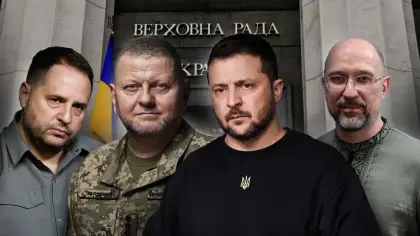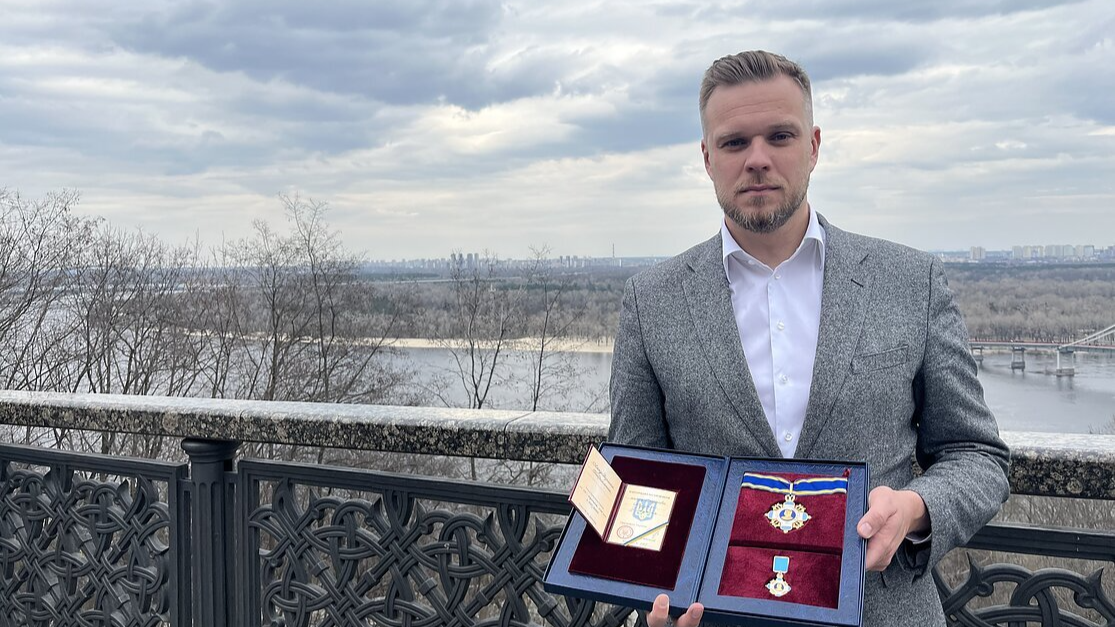These are tough and confusing days for embattled Ukraine. Uncertainty about when the desperately needed Western military support will arrive persists. So does the vagueness about when the Ukrainian leadership and parliament will get their act together to ensure that a proper mobilization law befitting the country’s “to be, or no to be” struggle against barbaric Russian imperialism is passed and implemented.
Now, on top of this, a series of abrupt and unexplained personnel changes within President Volodymyr Zelensky’s inner circle has blurred matters even more just as Russia has stepped up its daily missile and drone attacks on Ukrainian infrastructure and its efforts to break through on the front.
JOIN US ON TELEGRAM
Follow our coverage of the war on the @Kyivpost_official.
So where are we at? What are the latest signals telling us?
Certainly, the unforeseen long delay in securing the continuation of essential American support for Ukraine's war effort is grounds for major concern, balanced out, fortunately, by the energizing effect this procrastination and its implications has had on European states.
The political infighting in Washington and its impact on sustaining the flow of military aid to Ukraine in the required quantities has, fortunately, resulted in galvanizing much of Europe. More and more of its leaders realize that the EU itself has to get its act together, stand on its own two feet, and, in order to withstand the threat from Russia, be able to defend itself with or without US backup.
At this stage, two-plus years into the war against Russia’s full-scale war against it, Ukraine’s fate depends on two principal factors: a domestic one, that is, the quality of Ukraine’s leadership in these dire times, and the strength of society’s commitment to fight off the enemy; and, an external one – the extent and timeliness of the democratic world’s support for Ukraine.
Let’s focus on the domestic aspect which does not always get the proper scrutiny that it warrants.
Zelensky has proved himself to be an exemplary wartime leader and communicator of Ukraine's predicament and needs to the outside world.
But, in the third year of this horrific war, the president has shown signs of slipping up as regards transparency with his own people about what he and his handpicked inner team are up to.
This occurred, for example in the abrupt firing of his highly respected Ukrainian ambassador to the UK, Vadym Prystaiko, in July 2023; the replacement of the former Defense Minister Oleksii Reznikov; and most notably the messy way in which the highly popular Commander-in-Chief of the Armed Forces, Valerii Zaluzhny was moved aside.
Furthermore, the Ukrainian leader’s inner circle of advisors within his presidential office, none of them being elected officials, have been allowed to assume the role of a shadow government, superseding ministers and ministries, and this has increasingly raised questions and eyebrows.
And now again, suddenly last week and without explanation, Zelensky has reshuffled the leadership of the country’s security apparatus and dismissed a host of aides and advisors from within his inner circle.
These included the Secretary of the National Security and Defense Council of Ukraine (RNBO) Oleksiy Danilov, Serhiy Shefir, Zelensky's First Aide and a long-time business partner; and several more deputy heads of the President’s Office and presidential advisors.
Are we seeing Zelensky himself opting for a questionable way of ruling in what is after all still constitutionally a presidential-parliamentary democracy, or the inordinate influence of some of his closest advisors, read, gatekeepers?
Why the apparent hypersensitivity to ratings in political opinion polls during wartime when there is difficult work to do and tough decisions to be made?
Perhaps it’s because of the lesson from the case of the great British wartime leader, Winston Churchill, with whom Zelensky has frequently been compared. If the Ukrainian president were to leave the heights of the political scene (remember what happened to Churchill, who in 1945, despite all his accomplishments was voted out of power shortly after the end of World War II), where would it leave all his self-important aides and spokespersons?
So, it’s logical that some of Zelensky’s inner circle, and in particular his grey cardinal, Andriy Yermak, appear so concerned about the president’s popularity ratings – because their continued empowerment depends on his remaining in power. Potential political contenders such as Zaluzhny therefore need to be “neutralized” and, presumably, control within the inner circle consolidated.
Observers noted that the more controversial figures in the President’s Office, namely its head, Yermak, and his deputy, Oleh Tatarov, as well as the press secretary Serhii Nykyforov, have remained in place and appear more confident than ever.
Or could it be perhaps that Zelensky is himself doubtful about the nature and efficacy of the Ukrainian political and economic system that he inherited on winning the presidential election back in 2019.
His own hastily cobbled-together Servant of the People party is showing increasing signs of internal disarray and is forced to rely on makeshift unholy alliances with political opponents in the parliament. Some of his ministers are viewed as not being up to the task and as executors of his office’s will rather than creative initiators and shapers of policy.
“We continue to reboot our state institutions,” Zelensky said tellingly in his evening address to the nation on March 30. “Several changes have been made this week and there are still more decisions in preparation.”
But here transparency as to what is going on is needed so as to reassure the population and external allies. And the role of the free media is vital here. There can be no excuses, the constraints imposed by the exigencies of war being understood, for questioning its role.
And openness of the proper sort applies not only to what is happening at the apex of the country’s political system but what the realistic picture of losses and destruction inflicted by the enemy are.
Which leads to other issues of increasing concern, both domestically and for Ukraine’s numerous external supporters. Let’s just take the key ones at this stage.
Corruption. Yes, progress has been made, and continues to be made, in this swamp of a malaise. But as old forms of it are being addressed, is enough being done to tackle the newer manifestations of this curse? Both at the highest and lowest levels?
If the former clout of the country’s main oligarchs has been markedly diminished, is the hydra of corruption sprouting new heads some of which are easier to conceal because of the new challenges and temptations created by the war?
For instance, representatives of big business and financial organizations have been complaining more and more in recent months about what they see as undue pressure on them from forces supposedly acting in the interest of the state. And why are the penalties for corruption during wartime not made far more severe?
And there’s the very hot issue of mobilization.
Why, a third year into the war, with Zelensky incessantly appealing for the West to speed up its supply of military weapons and equipment, has the issue of mobilizing the full and necessary potential of Ukraine’s military capacity been so delayed?
The current approach, when Ukraine is fighting for its very right to exist, of relying on men over 27 to around 60, to man the front lines is both inexplicable and reprehensible.
And last but not least is the worrying question about the political future of Ukraine when the war ends. Where are the new faces in politics, the leaders of tomorrow? Is the country any closer to seeing modern political parties emerge that are built around clear programs rather than affluent individuals, power brokers and populists?
Yes, the war has accelerated the crystallization of a political nation, but how prepared will Ukraine be to govern itself democratically and transparently when it will have to face the immense challenges of recovery, rebuilding and managing foreign investment, aid and debt repayment?
Winning the war remains the number one priority. But thought also needs to be given to what is happening right now in the body politic and society more broadly, and where the country is headed.
You can also highlight the text and press Ctrl + Enter






